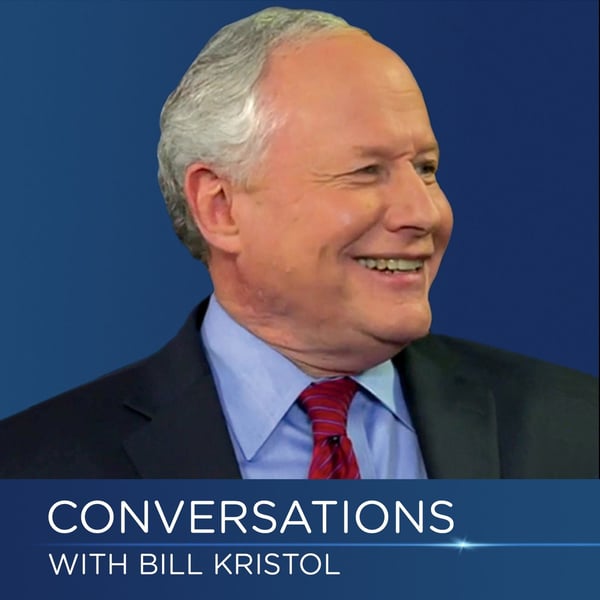Aaron Friedberg: The War in Ukraine and the Geopolitical Moment
Conversations with Bill Kristol
Conversations with Bill Kristol
4.7 • 1.7K Ratings
🗓️ 23 March 2022
⏱️ 86 minutes
🧾️ Download transcript
Summary
Transcript
Click on a timestamp to play from that location
| 0:00.0 | Hi, I'm Bill Crystal. Welcome back to conversations. I'm very pleased to be joined again today by my friend Aaron Feedberg, professor of politics at Princeton author of a new book just out, I believe getting China wrong. |
| 0:29.0 | Aaron and I have discussed China a couple of times on these conversations. I think very much worth listening to or watching and very much vindicated honestly by events subsequent to the conversations over the last few years. |
| 0:40.0 | Aaron teaches international relations at Princeton, and I'm particularly fond of his first book, which was his PhD thesis, the weary Titan, the very detailed historical study of British foreign policy between 1895 and 1905. |
| 0:54.0 | We get lots of lessons, I think, for other nations at other times as well. Anyway, Aaron, thanks for joining me. |
| 1:01.0 | Thank you very much, Bill. It's good to be back. |
| 1:03.0 | And just to be clear, since we're going to talk about what's happening in Ukraine and its broader implications for the world, and at the end towards the end a little bit more specifically look at some of the implications for China, which hasn't been quite as much in the headlines these days. |
| 1:18.0 | But just since things can change so quickly, this is the morning of March 22nd, about a month into the war. And so where are we? |
| 1:29.0 | I mean, what have we learned from these almost four weeks now of war? And then we'll go on to discuss sort of the broader implications of what's what's what's been happening? |
| 1:41.0 | Well, we've learned, I think, that among other things that the Russians are not quite as capable in terms of military capabilities as we had thought. |
| 1:54.0 | I think in a broader sense, we ought to have learned that we should have finally have gotten a message that we've come to the end of the post Cold War period that it's been 30 years since the collapse of the Soviet Union. |
| 2:07.0 | And I gathered as Putin has an affinity for anniversaries, so it may not be an accident that he chose to do what he's done when he did it. |
| 2:15.0 | But during that period, we've operated on the assumption that it would be possible to incorporate China and Russia into an integrated global economy and into a liberal international order. |
| 2:29.0 | There's been accumulating evidence that that wasn't working. I think we got an early and pretty stark indication of that 2014, what Russia did in Ukraine then, but also what China started to do in the South China Sea at that time. |
| 2:44.0 | But we've been moving along without really responding, I think, adequately to the growing signs of a danger. |
| 2:53.0 | It seems pretty clear that that experiment that attempt has failed, not only have Russia and China not become some status quo liberalizing powers, but they're behaving increasingly aggressively and obviously Russia more so even than China right now. |
| 3:10.0 | I think that's just an accident to look Putin has become more rational over the years and in the Chinese case, they happen to have a new president who's centralizing power, but it could sort of proceed or if we push Putin back, we could be back to something more like what we've experienced for the last 30 years. |
| 3:26.0 | Are you think this really is an inflection point? |
| 3:29.0 | I think it is an inflection point that norms have been broken, certainly by the Russians, and we'll talk, I think, about the response that his actions have gotten in Europe. |
| 3:42.0 | I think people's attitudes towards Russia have changed the awareness of the dangerous pose, not only by Russia, but by China, and not only in terms of their military capabilities, but the dangers that arise from the economic vulnerabilities that we have |
| 3:57.0 | because of the way our relationships with those countries have evolved over the last 30 years. |
| 4:02.0 | So I do think this is an inflection point. I can't see us going back to anything resembling the relationship that we previously had with Russia, and I don't think that's likely in the case of China either in part because I think the Chinese are going to try to take advantage of this and push for their own reasons. |
| 4:19.0 | We'll see. It's always possible that people will try to explain things away and get back to business as usual. There's always that temptation. |
... |
Please login to see the full transcript.
Disclaimer: The podcast and artwork embedded on this page are from Conversations with Bill Kristol, and are the property of its owner and not affiliated with or endorsed by Tapesearch.
Generated transcripts are the property of Conversations with Bill Kristol and are distributed freely under the Fair Use doctrine. Transcripts generated by Tapesearch are not guaranteed to be accurate.
Copyright © Tapesearch 2025.

